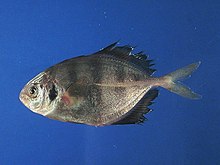| Hemicaranx amblyrhynchus | |
|---|---|

| |
| Conservation status | |
 Least Concern (IUCN 3.1) | |
| Scientific classification | |
| Domain: | Eukaryota |
| Kingdom: | Animalia |
| Phylum: | Chordata |
| Class: | Actinopterygii |
| Order: | Carangiformes |
| Family: | Carangidae |
| Genus: | Hemicaranx |
| Species: | H. amblyrhynchus |
| Binomial name | |
| Hemicaranx amblyrhynchus (G. Cuvier, 1833) | |
| Synonyms | |
| |
Hemicaranx amblyrhynchus (bluntnose jack) is a tropical marine fish in the jack family (Carangidae). It is found in shallow parts of the western Atlantic Ocean.
Description
The bluntnose jack is a deep bodied fish with a large, deeply forked tail fin. The dorsal fin is divided in two parts and has 8 spines and 27 soft rays. The long anal fin tapers towards the tail and has 3 spines and 23 soft rays. Adults normally grow to about 25 cm (10 in) in length.
Distribution
The bluntnose jack is found in the neritic zone in the western Atlantic Ocean at depths down to about 50 metres (160 ft). Its range extends from North Carolina, through the Gulf of Mexico an southwards to Florianópolis in Brazil. It is largely absent from the Lesser Antilles.
Ecology
The bluntnose jack is sometimes associated with the jellyfish, Lychnorhiza lucerna.
References
- Smith-Vaniz, W.F.; Williams, J.T.; Pina Amargos, F.; Curtis, M.; Brown, J. (2015). "Hemicaranx amblyrhynchus". IUCN Red List of Threatened Species. 2015: e.T190340A16510637. doi:10.2305/IUCN.UK.2015-4.RLTS.T190340A16510637.en. Retrieved 20 November 2021.
- ^ Bailly, Nicolas (2011). "Hemicaranx amblyrhynchus (Cuvier, 1833)". WoRMS. World Register of Marine Species. Retrieved 2012-04-02.
- ^ Hemicaranx amblyrhynchus (Cuvier, 1833): Bluntnose jack FishBase. Retrieved 2012-04-02.
- Nogueira, M. Jr.; Haddad, M. A. (2005). "Lychnorhiza lucerna Haeckel (Scyphozoa, Rhizostomeae) and Libinia ferreirae Brito Capello (Decapoda, Majidae) association in southern Brazil". Revista Brasileira de Zoologia. 22 (4): 908. doi:10.1590/S0101-81752005000400015.
| Taxon identifiers | |
|---|---|
| Hemicaranx amblyrhynchus | |
| Caranx amblyrhynchus | |
This Carangiformes-related article is a stub. You can help Misplaced Pages by expanding it. |